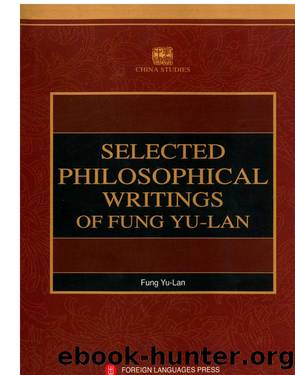å¯åå °å²å¦æéï¼è±æ by 冯友兰

Author:冯友兰
Language: eng
Format: epub
Publisher: 外文出版社
Published: 2008-01-15T00:00:00+00:00
Chapter XIII THE REALISTIC WING OF CONFUCIANISM: HSUN TZU
The three greatest figures of the School of Literati in the Chou Dynasty were Confucius (551-479 B.C.), Mencius (371 ?-289? B.C) and Hsun Tzu. The latter's dates are not definitely known, but probably lay within the years 298 and 238 B.C.
Hsun Tzu,s personal name is Kuang, but he was also known under the alternative name of Hsun Ching. He was a native of the state of Chao in the southern part of the present Hopei and Shansi provinces. The Shih Chi or Historical Records says in its biography of him (Ch. 74) that when he was fifty he went to the state of Chi, where he was probably the last great thinker of the academy of Chi-hsia, the great centre of learning of that time. The book bearing his name contains thirty-two chapters, many of them detailed and logically developed essays which probably come directly from his pen.
Among the literati, Hsun Tzu's thought is the antithesis of that of Mencius. Some people say that Mencius represents the left wing of the school, while Hsun Tzu represents its right wing. This saying, while suggestive, is too much of a simplified generalization. Mencius was left in that he emphasized individual freedom, but he was right in that he valued super-moral values and therefore was nearer to religion. Hsun Tzu was right in that he emphasized social control, but left in that he expounded naturalism and therefore was in direct opposition to any religious ideas.
Position of Man
Hsun Tzu is best known because of his theory that human nature is originally evil. This is directly opposed to that of Mencius,
according to which human nature is originally good. Superficially, it may seem that Hsun Tzu had a very low opinion of man, yet the truth is quite the contrary. Hsun Tzu's philosophy may be called a philosophy of culture. His general thesis is that everything that is good and valuable is the product of human effort. Value comes from culture and culture is the achievement of man. It is in this that man has the same importance in the universe as Heaven and Earth. As Hsun Tzu says: "Heaven has its seasons, Earth has its resources, man has his culture. This is what is meant [when it is said that man] is able to form a trinity [with Heaven and Earth]."[213]
Mencius said that by developing one's mind to the utmost, one knows one's nature, and by knowing one's nature, one knows Heaven.[214] Thus, according to Mencius, a sage, in order to become a sage, must "know Heaven." But Hsun Tzu maintains, on the contrary: "It is only the sage who does not seek to know Heaven."[215]
According to Hsun Tzu, the three powers of the universe, Heaven, Earth and man, each has its own particular vocation: "The stars make their rounds; the sun and moon alternately shine; the four seasons succeed one another; the Yin and Yang go through their great mutations; wind and rain are widely distributed; all things acquire their harmony and have their lives.
Download
This site does not store any files on its server. We only index and link to content provided by other sites. Please contact the content providers to delete copyright contents if any and email us, we'll remove relevant links or contents immediately.
A Friend in the Dark by Pascal Ruter(216)
The Art of SEO by Eric Enge Stephan Spencer and Jessie Stricchiola(203)
Digital Infrared Photography Photo Workshop by Sandidge Deborah(196)
Man-Machine-Environment System Engineering by Unknown(193)
Different-Worlds-18 by Unknown(188)
The Pyramid Mind by Vlad Beliavsky(176)
Encyclopedia Of Mathematics (2005) by Unknown(169)
Brave by Wendy Constance(162)
The Three Rs and the Humanity Criterion by Michael Balls(152)
å¯åå °å²å¦æéï¼è±æ by 冯友兰(144)
Pirates, Prisoners, and Lepers: Lessons from Life Outside the Law by Paul H. Robinson & Sarah M. Robinson(144)
To Me, The One Who Loved You by Yomoji Otono(138)
Command-Line by Unknown(137)
Randolph Caldecott--The Man Who Could Not Stop Drawing by Leonard S. Marcus(129)
Fairy Tales for the Disillusioned by Gretchen Schultz(129)
SAYE by Wu Zhe(127)
Minimally Invasive Orthopaedic Trauma by Gardner Michael J.;Siegel Jodi;(125)
Computational Geometry by Unknown(124)
Copyright by Peter Qin(121)
